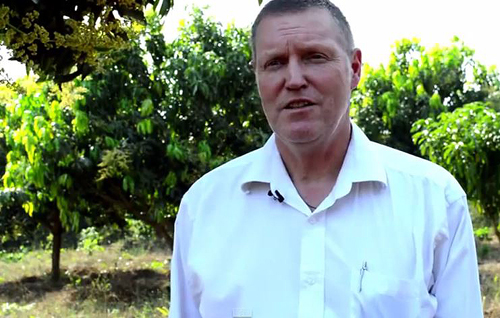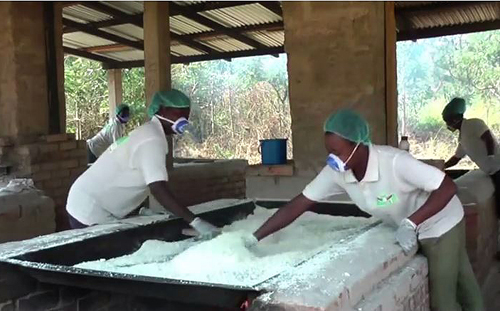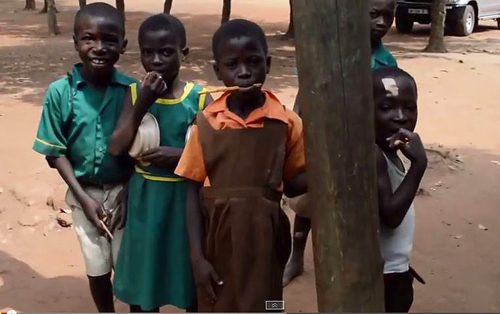By Samantha Beattie, BA ’13
While completing her Guelph degree in international development, Samantha Beattie worked for U of G’s SPARK (Students Promoting Awareness of Research Knowledge). She is now studying journalism at Sheridan College and originally published this profile of Guelph professor Andy Gordon in Sheridan’s pundit magazine.

Standing tall and silent in the African sun, Prof. Andy Gordon watches three young Ghanaian girls wrap their spindly arms around the well lever. Their chant-like chorus sets a rhythm as they jump up and down in nearly perfect unison. Cool water gushes out of the faucet into bright yellow containers.
They laugh despite their hard work, and Gordon can’t help but think of his own four-year-old son Ross’s easy smile – two chubby cheeks and a wide grin – a world away.
Gordon tries to shake these feelings of want and unease, which have dogged him throughout his one-week visit to rural Republic of Ghana in January 2014. As head of the University of Guelph’s agroforestry department and director of the Canadian government-funded project Agroforestry Practices to Enhance Rural Livelihoods (APERL), Gordon is used to travelling.
Agroforestry is the practice of planting trees in between traditional crops to stop soil erosion and improve soil health, biodiversity and forest cover. Agroforestry also helps to diversify the income of African farmers
Throughout his 30-year career, Gordon has visited more than 60 countries and worked on agroforestry development projects in at least half. But no amount of travelling seems to lessen the gut-wrenching clench of homesickness. Since marrying his wife, Shelly, experiencing the birth of his only child, and moving to a farm, Gordon finds climbing onto a plane and travelling for 20 hours more emotionally taxing than ever before.
“I try not to be away all that much,” says Gordon. “The longest amount of time I leave for is about one week. Even so, this year I chose a really bad time to go. I left my wife to deal with the bitter cold and icy driveway. Then my son had a fever and my cousin passed away. It is incredibly hard.”
And yet, he pushes those feelings away as he walks past tottering stone huts and thirsting palm trees to where a group of women in brightly patterned skirts peel and chop cassava. They’re working to produce a flour-like product called gari. This business was set up by Gordon’s project and hires about 62 locals, three quarters of whom are women.
As they work away, sifting and pressing and singing, Gordon stops to talk with the gari employees and cassava farmers. “It is so nice to go down the road and just stop and wave to people,” says Gordon. “I smile at somebody and I immediately get this big warm response back. It is just the small moments that make all the sacrifice worth it.”

Bringing hope to Ghana
APERL began in 2007 when Gordon and a team of Guelph researchers received $3.5 million from Foreign Affairs, Trade and Development Canada.
The project is a collaboration with Ghana’s Kwame Nkrumah University of Science and Technology to help smallholder farmers from six communities escape poverty.
Gordon’s colleague and project leader Professor Naresh Thevasthasan says diversity is the key to agricultural survival. “Andy, myself and the rest of the team are using what we know about agroforestry to help men and women farmers find new ways to earn money,” says Thevathasan. “We’ve given them mango and citrus trees to grow outside their houses or in between crops, so even if their cassava or maize doesn’t do well that year, they can still sell mangos and oranges to get by.”
Through APERL, farmers also learn how to raise goats, pigs and sheep, and start mushroom businesses.
“It is very rewarding to see the smiles of children who are able to go to school because their parents have benefitted from our project and can pay for uniforms and fees,” says Gordon. “That’s the great thing about APERL, it’s well conceived and well put together, so we’re seeing real change.”
An unexpected path
When he first studied agroforestry more than 30 years ago, Gordon never imagined he’d be the director of a large-scale development project in Ghana. In fact, when he received his bachelor’s degree in forestry science from the University of New Brunswick in 1978, he assumed he’d focus his career on Canada’s dense boreal forests.
His doctorate from the University of Alaska in 1984 and a position in U of G’s agroforestry department didn’t change his mind either. It wasn’t until Gordon attended a conference in Nairobi, Kenya that he saw the potential of his agroforestry knowledge.
“When I was there, I got talking to people who had all these agricultural problems,” says Gordon. “They wanted to know how they could improve their farm revenues and ecological health. “
Agroforestry seemed to be the answer time and time again. “So, slowly I began to realize agroforestry has the potential to change the lives of very poor farmers and help develop a rural community from the bottom up.”
His willingness to help others shaped the University’s agroforestry program and attracted students from all over the world.
“One thing led to another and before I knew it I was getting international students coming to Guelph to learn more. And then they’d ask me to start projects in Vietnam or Bolivia or Argentina or Chile or Indonesia.”
At first the work overseas was a struggle for Gordon, who was used to the relative efficiency of Canadian research compared to the difficult conditions in developing countries. He says a lot of money often has to be siphoned off for bribes. Hours are wasted outside officials’ offices, waiting to get a handshake, and months pass before the project is even allowed to begin.
It was during such a project in Nepal that Gordon realized stressing about what he wasn’t getting done wasn’t going to change the process. He learned to be more resigned and now makes the most out of whatever ends up happening.
“When I go to these places, I am reminded of how little these people have and how fortunate I am,” he says. “So it makes sense for me to use my skills and knowledge to help others, to give back a little and push for positive change, even if it takes more effort or time than it should.”
It’s no surprise Gordon’s knowledge is so sought after in the developing world. The United Nations released a statement in February 2013 stressing agroforestry’s potential: “Millions of people could escape poverty, hunger and environmental degradation if countries put more effort into promoting agroforestry. Almost half the world’s agricultural land has at least 10-per-cent tree cover, making agroforestry critical to the livelihoods of millions.”

To the Congo and back
Gordon’s knowledge of how to grow life in the world’s most decrepit soils sometimes draws him to lawless and dangerous countries, testing his dedication and willpower. He says his wife’s support helps him stay focused on his purpose – to make a difference. Before Gordon goes away, he gives her a list of all the places he will be visiting, and also texts her throughout his journeys.
Staying in touch helps ease both of their worries about each other, such as Shelly slipping on the icy driveway or dropping Ross off late for school, as well as frightening possibilities that come alongside Gordon’s job, such as contracting malaria, being kidnapped or getting robbed.
This year they’ve had more trouble pushing aside these anxieties. Gordon visited the Democratic Republic of Congo to help the U of G’s Alfred Campus with an agroforestry project there. At the end of the trip, Gordon and Thevathesan travelled through the airport in Kinshasa. To get out of the country, Gordon stood by a checkout counter and paid a bribe to a security guard.
A few months later, Gordon saw that very same airport counter on the six o’clock news. Gunmen had entered the airport and fired bullets exactly where he and Thevathesan had been standing.
“It was very disconcerting and reminded me how careful I have to be travelling to places like the Congo,” says Gordon. “But at the same time, my wife and I are fairly used to the risks I have to take and know how to cope with them.”
One thing he couldn’t stop thinking about, though, was one of the airport staff who had made sure he only paid the smallest bribe possible. After seeing what had happened on the news, he sent her a care package with maple syrup.
“It was important to me to make sure she was okay.”
Despite the dangers and the time lost away from his family, Gordon still plans on returning.
A sense of humanity
“What strikes me about Andy when I compare him to the hundreds of agricultural scientists I’ve known is that he has a sensitivity about working in developing countries, and he really does care,” says rural development professor Hambly Odame, the project’s social science lead. “Senior scientists don’t have to care about social or environmental justice,” says Hambly Odame. “They can work in their own little box and not necessarily give back, but Andy has a very human side to him that pushes him to leave his comfort zone and make a difference in the world.”
On that late afternoon at the well in Ghana, Gordon takes out his Blackberry and records a video of the small girls playing and working in tandem. He stores the video alongside one of his son strumming unevenly on an acoustic guitar and confidently singing an unrecognizable ballad.
Gordon smiles. He turns his attention to the young girls. All three race over to him. They’re begging to watch their dancing selves from a few moments ago. Gordon crouches down, presses play and listens as their joyful giggles fill the hot and hazy afternoon air.
VIDEO: Click to view Samantha Beattie’s documentary film, “Growing Hope in Sunyani West District Ghana,” about the Agroforestry Practices to Enhance Rural Livelihoods project directed by U of G professor Andy Gordon.